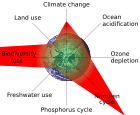Equo
Equo | |
|---|---|
 | |
| Spokesperson |
Rosa Martínez Juan López de Uralde |
| Founded | 4 June 2011 |
| Preceded by |
List
|
| Headquarters |
Calle Jiloca, 4 28016 Madrid |
| Youth wing | Red EQUO Joven |
| Membership (2016 affiliated, 2012 registered) | 3,394[1] affiliated, 12,000 registered[2] |
| Ideology |
Green politics[3] Eco-socialism[4][5] Ecofeminism[6] |
| Political position | Left-wing |
| National affiliation | Unidos Podemos |
| European affiliation | European Green Party |
| International affiliation | Global Greens |
| European Parliament group | Greens–European Free Alliance |
| Colors | Green |
| Congress of Deputies |
3 / 350 Inside Unidos Podemos[7] |
| European Parliament (Spanish seats) |
1 / 54 In the coalition European Spring |
| Regional parliaments |
6 / 1,278 [8][9] |
| Local Government |
104 / 67,611 |
| Website | |
|
www | |
Equo (also spelled Q, or eQuo) is a Spanish political party founded on 4 June 2011, when 35 different Spanish green parties agreed to merge into EQUO. It began as a foundation on 24 September 2010 with the goal of becoming "the seed and source of debate about political ecology and social equity, originating a sociopolitical movement".[10]
The first election it contested was the Spanish general election, 2011, obtaining 216,748 votes (0.9%), making it the 9th most supported party.[11] The party was fifth in Madrid,[12] achieving representation thanks to the Valencian coalition Compromís-Q, in which EQUO participated.[13]
In Catalonia, the European Green Party is represented by the Initiative for Catalonia Greens.
At the national elections of 20 December 2015 EQUO joined the list of Podemos. This resulted in seats for three EQUO candidates: Juantxo López de Uralde, Rosa Martínez and Jorge Luis Bail.[14]
Electoral performance
Cortes Generales
|
| ||||||||||||||||||||||||||||||||||||||||||||||||||||||||
- * Within Podemos—En Comú Podem–És el moment–En Marea.
- ** Within Unidos Podemos.
See also
References
- ↑ Equo (2016-05-10). "Equo will contest the 26-J election in coalition with Podemos and United Left" (in Spanish). Retrieved 2016-05-16.
- ↑ http://www.lamarea.com/2012/07/08/equo-cierra-su-primer-congreso-con-islandia-como-modelo/
- ↑ Nordsieck, Wolfram (2016). "Spain". Parties and Elections in Europe.
- ↑ European Spring (PE). The Democratic Society. Published 20 May 2014. Retrieved 3 June 2018.
- ↑ APPENDIX A3. European Social Survey. Political parties, ESS7 - 2014 ed. 3.0. p.35. Retrieved 3 June 2018.
- ↑ http://partidoequo.es/que-es-el-ecofeminismo/
- ↑ País, Ediciones El (21 December 2015). "Los otros escenarios del 20D: de la caída de Bildu al auge del Pacma". elpais.com. Retrieved 15 October 2016.
- ↑ "EQUO pasa de 23 a 90 concejales y está presente en 14 capitales de provincia". eldiario.es. Retrieved 15 October 2016.
- ↑ Juan Ponce and Cristina Rodríguez Armigen, elected as part of Greens Equo of the Valencian Country/Compromís in the Corts Valencianes.
David Abril, elected as part of Més per Mallorca in the Parliament of the Balearic Islands.
Alejandro Sánchez Pérez, elected as part of Podemos in the Assembly of Madrid.
Carmen Molina elected as part of Podemos in the Parliament of Andalusia.
José Ramón Becerra elected as part of Elkarrekin Podemos in the Basque Parliament. - ↑ "Who are we?" (in Spanish). Retrieved 9 December 2011. .
- ↑ "Results of the 2011 Spanish general election" (in Spanish). Retrieved 9 December 2011.
- ↑ "Results for the 2011 Spanish general election in the Community of Madrid" (in Spanish). Retrieved 9 December 2011.
- ↑ "Equo goes in the Congress, but only thanks to Compromís" (in Spanish). Retrieved 2 December 2012.
- ↑ "EQUO entra en el Congreso con 3 escaños". partidoequo.es. Retrieved 15 October 2016.
